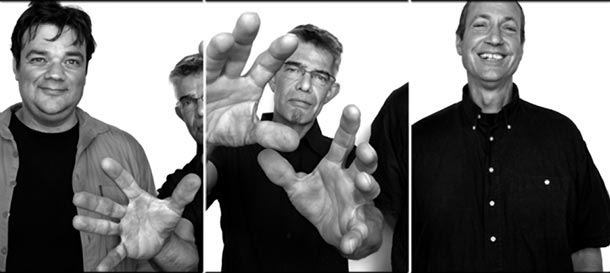| At one point, pianist Braam rapidly flipped backwards though the pages of a small booklet — 'the book' of the trio's tunes — all the way to the front cover, then plopped it down. The audience laughed and Braam started to play.
"Tune 7 & 5" — two tunes played together, as it turned out — was, in retrospect, all about Braam's spinning piano lines that smoothly elided into a repeating and vigorous bass/piano vamp, which then changed into a section featuring DeJoode's slithering arco bass and Vatcher's free-ranging drums. This multi-part tune resolved plausibly with the concluding and soothing church cadence, 'a-men'.
Next, a crowd-pleasing blues piece vibrated with trills and tremors and releases, built as it was around the stomping riff from Muddy Waters' "Hootchee Koochee Man". The frailing bass and the hard-sticked drums really hit, as did Braam's spirited tonal interjections. Interestingly, after a later section with a dancing Cuban/Latin feel, the tune stopped, abruptly. That was their way.
|
| The Dutch trio's unusual and historical — occasionally hysterical — approach to playing through (and with) the history of modern jazz into free, pleased the mostly curious audience, for right to the final bar, these advanced players 'played the tradition' with respect, affection, and artistry.
After a short Break, the Toronto guests, Scott Thomson and Doug Tielli, brought their slide trombones to the stage. Just the two of them. Thomson's clear open horn lead line was soon joined by Tielli's muted rippling sound column and so began their freely improvised duets.
Both players played the sounds of today, as well as conjured up the plunger-muted talkative moans of earlier musicians like Tricky Sam Nanton through Scott Thomson or, like Tielli, they inserted into the music sounds which ranged from continuously fluffy to pesky, to huffing and puffing, to lips wobbling off the mouthpiece and emitting sudden fluffs and wheezy streams.
When bassist DeJoode entered, the sounds of creaky doors and hinges further became high arco trills, sul ponticello rhythms, and then pizzicato throughlines, as the dialogue between the two trombones and drums continued. Then Vatcher introduced Thomson's boppish and swinging lines as they gradually died down to pianissimo to sonically reveal Tielli as, ultimately, alone.
The next piece involved the full piano trio and two trombones. When Vatcher's sticks pulsed against Tielli's throb and Thomson's talk — and Braam's piano continued to scamper and stream — two motorcycles roared past on Queen Street.
Their loud and unmuffled sound fit right into the group growl and piano tinkles that emanated from The Rex stage. Then, bassist DeJoode flipped to another page in the book of tunes.
The trio (plus two) were clever and artistic — and the audience really lucked out — because these players can really play, in all senses of the word.
|


